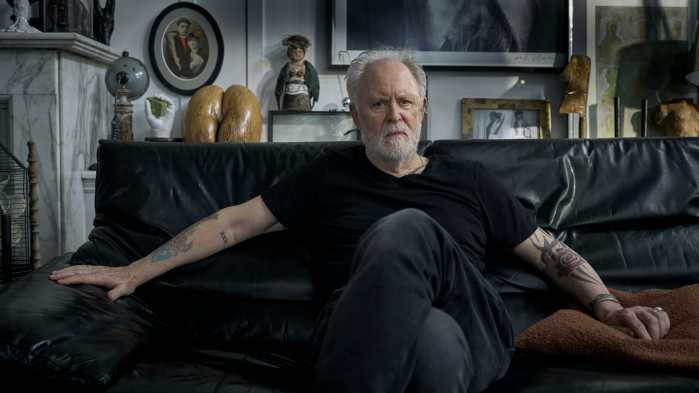While this isn’t a new phenomenon, capitalism has become adept at selling us back critiques of itself, financed by and benefiting the same oligarchs they represent. Take movies and TV shows like “The White Lotus,” “Squid Game,” “Triangle of Sadness,” and “Succession.” Strangely, I walked past a Netflix-sponsored “Squid Game” escape room on my way to a press screening of gay director Joshua Oppenheimer’s “The End.” On the surface, Oppenheimer’s sci-fi musical, set in a billionaire’s underground bunker 20 years after apocalyptic climate change, is more of the same. Yet it’s not nearly so easily consumable. (While “Triangle of Sadness” won Cannes’ top prize, to the applause of the 1% it mocks, “The End” was rejected by the festival.) It’s hard to write about because it’s difficult to even figure out what it’s trying to accomplish. “The End” flirts with camp, but just barely. Its arch tone suggests comedy, but it backs away from that as well. Oppenheimer is likely to have only one chance to make a film at this budgetary level, because it’s likely to be commercial suicide. Given all that, I wish it were more enjoyable.
“The End” begins with stock characters, treated with a degree of irony. They’re not given names. Instead, the film labels them Mother (Tilda Swinton), Father (Michael Shannon), Son (George McKay) and Girl (Moses Ingram). Father made his fortune as the CEO of a huge oil company, and he collaborates with Son on a memoir denying his responsibility for the planet’s destruction. Mother dreams of her past as an artist, dancing with the Bolshoi ballet, but she now serves her husband unhappily. Having his entire life underground, only interacting with his parents and their servants, Son is socially awkward. Girl is a poor outsider, one of only two Black people in the film, who gains admittance to the bunker and becomes Son’s partner. Constantly reminded how provisional her acceptance is, she holds out the possibility of changing the family. Even the secondary characters, like the butler (Tim McInnerney), riff upon archetypal tropes. He’s a gay man defined by his loneliness, obviously attracted to Father, who responds with homophobic slurs.
After years of shorts, Oppenheimer made his mark with the 2013 documentary “The Act of Killing.” Both it and “The End” are fascinated with the violence inherent in power, connecting it to forms of American entertainment. Working in Indonesia (with co-directors Christine Cynn and an anonymous native of the country), Oppenheimer helped gangsters who murdered “communists” on behalf of the government during the ‘60s make films about their experiences. The harms caused by Father are deadly on a far larger scale, but he’s even further in denial.
“The End” sticks to one enormous set, which looks highly theatrical. (It was actually constructed in a salt mine thousands of feet below the earth’s surface.) The family dwells among an expensive collection of books and paintings. They ignore the meaning contained within all that art: Francis Denby’s 1840 “The Deluge,” in which desperate people try to save themselves from drowning, decorates Father’s study. As a musical, it’s haphazard. None of the cast are particularly talented singers, nor does composer Josh Schmidt contribute any memorable songs. This reads as an act of trolling.
Oppenheimer insists there’s no irony or satire intended in “The End.” He wants the audience to be able to see ourselves in its characters and realize the lies behind their blithe optimism. (One such example is Son’s diaroma, in which the Civil War and moon landing coexist.) In his eyes, for this to work, we need to be able to identify with them. However, “The End” is so off-putting that it denies any emotional charge. Its performances and changes in tone lead to whiplash. From its Toronto Film Festival screening a few months ago, critic Vadim Rizov wrote, “could Tilda Swinton play a normal person at this point, or are the once-chameleonic performer’s recognizable tics…unlearnable?” Neither the insistence on an upbeat surface or the darkness beneath it feel very genuine.
While they were likely just making excuses for themselves, the gangsters of “The Act of Killing” claim they watched Elvis movies to get pumped up for murder. “The End” locates a hollow cheer in American musicals that’s both seductive and dangerous. In its subtext, “The End” describes the very process of recuperating an outsider’s perspective I described at the start of my review. There may be something genuinely subversive in how unpleasurable its 148 minutes are. But its messiness makes it all too easy to watch and think “I have nothing in common with these rich weirdos” rather than ponder our collective responsibility towards the environment.
“The End” | Directed by Joshua Oppenheimer | Neon | Opens Dec. 6th at the Angelika and Alamo Drafthouse Brooklyn



































